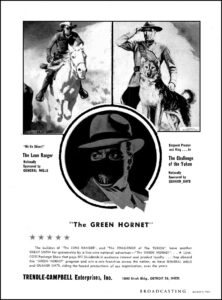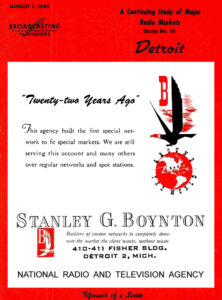 75 Years Ago, This Month, Broadcasting Magazine Reported In-Depth On the Status of the Radio Market in Detroit — Part 5
75 Years Ago, This Month, Broadcasting Magazine Reported In-Depth On the Status of the Radio Market in Detroit — Part 5
Note: Missed Chapter Four? Go HERE.
_____________________
Rather than buck the heavy advertising in the Thursday afternoon papers, he advised them to put their money in spots around the Breakfast Club hour, three of which were open. Avoiding price, for their quality foods couldn’t compete with the chains on that basis, the spots stressed just one special all week, with a reference to the convenience of “shopping where you work.” Each booth was to be featured for a week. Results were so good that the market has just signed to take two spots in the fall around the Kate Smith show, in addition to the regular purchase.
The Twin Pines Dairy, a cooperatively owned client of Luckoff, Wayburn & Frankel, has the Dr. Crane health program daily over WXYZ. Lately, the dairy has bought TV spots.
D & C Steamship Lines uses a heavy schedule of spots during the operating season on larger stations to promote excursions and cruises. WJR gets a large share of this business, aimed at tourist traffic from all over the Midwest. Another successful radio user is Cole & Irwin Co., buying 10 spots daily to sell jewelry and radios.
 Boyer’s Haunted Shacks, a chain of auto accessory stores, embarked on a saturation spot program on one station, WJBK, featuring an eerie squeaking door commercial, and the copy, “High prices don’t have a ghost of a chance at Boyer’s.” Mr. Luckoff says the chain has had remarkable success. Other leading L -W -F accounts are T. L. Grissom, local Chevrolet dealer, who broadcasts horse races from Detroit’s Fair Grounds; Detroit Ice Assn., using TV spots to promote use of ice; Progress Bedding Co., maker of Rest -O -Craft mattresses, using chain breaks around high Hooter rated shows; Wolverine Potato Chips, with participation shows: and Borin Ice &. Fuel, using TV spots.
Boyer’s Haunted Shacks, a chain of auto accessory stores, embarked on a saturation spot program on one station, WJBK, featuring an eerie squeaking door commercial, and the copy, “High prices don’t have a ghost of a chance at Boyer’s.” Mr. Luckoff says the chain has had remarkable success. Other leading L -W -F accounts are T. L. Grissom, local Chevrolet dealer, who broadcasts horse races from Detroit’s Fair Grounds; Detroit Ice Assn., using TV spots to promote use of ice; Progress Bedding Co., maker of Rest -O -Craft mattresses, using chain breaks around high Hooter rated shows; Wolverine Potato Chips, with participation shows: and Borin Ice &. Fuel, using TV spots.
Note: Mouse click over (pc) or tap and stretch (mobile screen) over the WXYZ ad image for largest detailed read.]
In addition to Industrial National Bank, radio has been used by practically all of the institutional and utilities advertisers in Detroit. Commonwealth Bank, through Ted Reeves, of Toledo, is a long-time user of spots.
Detroit Edison Co., electric power supplier to Detroit and suburbs, uses the H.C.L. Jackson (Detroit News columnist) show, and was one of the first TV sponsors in the area, with its Kitchen Carnival show on WWJ-TV. It has another TV show, the Jane Durelle Story Book, a children’s program five times a week. This is in keeping with the utility’s policy of spending 90% of its budget in goodwill and public service programs. The only sales effort now going on is a spot, campaign throughout southeastern Michigan on electric water heaters. Campbell-Ewald is agency for Edison.
Fred Randall Co. places the Michigan Consolidated Gas Co. sponsorship of the Lee Smits newscast over WXYZ. Though the bulk of Bell Telephone time is placed in New York, the Detroit office retains a measure of supervision over local programs.
It is a doubtful honor in the ears of many, but Detroit claims credit for the origination of the singing jingle. In 1928 Cliff MacDonald, of the coal company bearing his name, in looking for something different for his ads, hit upon the idea of making up a short song to be used in spot radio. He wrote the words to a tune composed by a Detroit pianist, Carl Rupp, and “MacDonald for coal, MacDonald for coke, MacDonald for quality fuel” was introduced by Russ Morgan’s orchestra, then active in Detroit. The tune caught on, and for years Mr. MacDonald was saluted with it whenever he entered a club or dance. It is still used in spots. Neff Radio Productions is the agency.
The position as oldest consistent advertiser on WJR goes with no opposition to the Ohio China Co. of Monroe, Mich. Using participations on the station’s Mrs. Page show, this company has used two spots per week for 18 years, renewing each year, and going through three different Mrs. Pages in that time. Finzel Agency of Monroe handles the billing. Two of the largest spot buyers in the city are Speedway Petroleum Corp. and Federal Department Stores. Both of these 1,000 or more spots-per-year buyers are handled by W. B. Doner & Co. Though a reluctant radio user at first, Speedway Gasoline now puts ‘75% of its budget into radio and is planning a TV show for fall. The King’s Jesters’ singing commercial, “Speedway’s Goin’ Steady With Ethyl,” has aroused many favorable comments.
Federal has had a 1,000 spot-per-year contract for the past five years, and formerly sponsored a local AM amateur show for seven years. With 12 stores in the Detroit area, Federal is planning a super-saturation in August, preliminary to opening a new store; 150 AM spots a day will be used and 30 TV, for two weeks. A preview, complete with columnists, representatives of national manufacturers and Powers models for color, will be telecast. W. B. Doner is president of the company, with Charles F. Rosen as executive vice president. They handle the bulk of the agency’s radio accounts.
Another brewer with a big radio and TV budget is E & B. This company, through the Doner agency, has been placing a third of its budget in air time, and is sponsoring Tuesday night wrestling matches, with a Friday wrestling show scheduled to start in a few weeks. In addition, it is using 20 time report spots per day on WJBK, and has spots running continuously in 10 out-state markets.
Other prominent Doner accounts are: Annis Furs, now buying eight spots per week on major stations, heavier during fur storage season; Enggass Jewelers, one of the oldest spot buyers in Detroit; Faygo Beverages, buying top spot and chain breaks when available; Detroit Retail Druggists Assn., which has five and 15-minute shows on four major stations simultaneously. Doner also prepares copy for the Big Bear chain of super markets, planning radio and TV shows later in the year.
Harry Betteridge, who resigned as general sales manager of WWJ and WWJ -TV in April to form the firm, of Denman & Betteridge, with Willian I. Denman, is another radio and television veteran in Detroit. In lining up sponsors for WWJ-TV, Mr. Betteridge was selling television a year-and-a-half before the first Detroit telecast.

Michigan Mutual Insurance Co. is one of the agency’s principal accounts, using spots 52 weeks a year on 25 stations in five states. Another outstanding effort was that of the Thomas J. Doyle Co., a Dodge-Plymouth dealer, in promoting its Glitter-Glaze, an automobile polish. Through a strong spot campaign over 17 years, it was able to make Glitter-Glaze a common noun in the city, a la Simoniz. Detroit and Toledo Philco distributors last year used nine half-hours per week on television, one of the heaviest TV buys in the U. S. Other active accounts of Denman & Betteridge are Silvercup Bread (Gordon Baking Co.) and New Era Potato Chips. The agency also places the DeSoto Dealers of Detroit business, a buy of telecasting rights to the horse races.
No history of Detroit radio would be complete without recounting the story of The Lone Ranger. This tremendously popular program, with two others, The Green Hornet and Challenge of the Yukon, was created and developed by George W. Trendle, who is now president of Trendle-Campbell Enterprises. Mr., Trendle entered radio in 1930, buying station WXYZ, and operating it with his theatre business associate, John H. King. The firm was then known as the King-Trendle Broadcasting Corporation.
Beginning in 1933, during the depression, the program was a hit from the start. Gordon Baking Co. (Silvercup Bread) began sponsorship in November of that year, and continued until 1941. Now in its seventeenth consecutive year of broadcasting, The Lone Ranger has established a world record for half-hour radio dramas. The show started on a three times a week basis in its first year, and continued without interruption until the death of FDR caused the first cancellation. Since 1941, sponsorship in most areas of the country has been by General Mills for their Brix, Cheerios and Pyequick, through Dancer, Fitzgerald-Sample. In the South and Southeast, the program is sponsored by Marita Bread, through Tucker, Wayne & Co., based in Atlanta, Ga.
The other half of the partnership is H. Allen Campbell, vice-president and general manager of T-C Enterprises, who went to the sales staff of WXYZ in 1930 from a Detroit newspaper. Within six months he was sales manager of the corporation. It was he who first sold The Lone Ranger as a network program, first with NBC Blue, then with ABC. Made general manager of Trendle-Campbell in 1933, he became vice president in 1946, when the firm began to be known as Trendle-Campbell Enterprises. In 1936, Trendle created The Green Hornet, still carried weekly by ABC as a sustaining program. Challenge of the Yukon, latest of the Trendle Trio, is currently being sponsored three times weekly by Quaker Oats Co., through Sherman & Marquette, Chicago. The company also owns and operates WTAC Flint, Michigan. MCRFB: to be continued next week . . . .
 This feature is a special Broadcasting series about Detroit radio. This was first released by the publication on August 1, 1949. It will continue as an exclusive presentation every Tuesday on this site throughout August and in the first and second two Tuesday in September, for a total of six weeks.
This feature is a special Broadcasting series about Detroit radio. This was first released by the publication on August 1, 1949. It will continue as an exclusive presentation every Tuesday on this site throughout August and in the first and second two Tuesday in September, for a total of six weeks.
Originally published in Broadcasting magazine under the title “The Detroit Radio Market,” this extensive article will be presented in six parts, continuing in sequential chapters.
The 1949 article provides valuable insights into the state of radio in Detroit during the late 1940s decade, as it was, then, seven decades ago.
![]()






